On Amirah Mitchell’s 1.5-acre farm, things works a little differently than at other vegetable farms. Throughout the summer and early fall, while other farmers are harvesting their produce for sale, Mitchell lets their crops grow, ripen and go to seed. That’s because it’s the seeds she’s after; her company, Sistah Seeds grows and sells African, African-American and Afro-Caribbean heirloom vegetable, grain and herb seeds, each tiny bit of matter holding not only the promise of future plants and gardens, but stories and wisdom stretching back into the past.
Mitchell, who currently farms on a plot of land that’s part of The Seed Farm, an agricultural incubator in Emmaus, PA, has gained experience farming and seed-keeping over the past decade, and though Sistah Seeds was formally founded in 2021, it’s a dream and a vision that they’ve been cultivating since they were a teenager.
The first Sistah Seeds catalog was made available in early 2023, offering unique heirloom vegetables, like Chocolate Scotch Bonnet peppers, an important ingredient in Caribbean food, and Moody Family Okra, which can be traced back to the 1830’s by the Moody Family in currently residing Alabama, who carried it with them from West Africa. Some of the seeds Mitchell produces have a personal connection to her family; she grows Green Striped Cushaw Squash in honor of her great-grandfather, who loved the variety and grew it in his own garden in North Carolina.
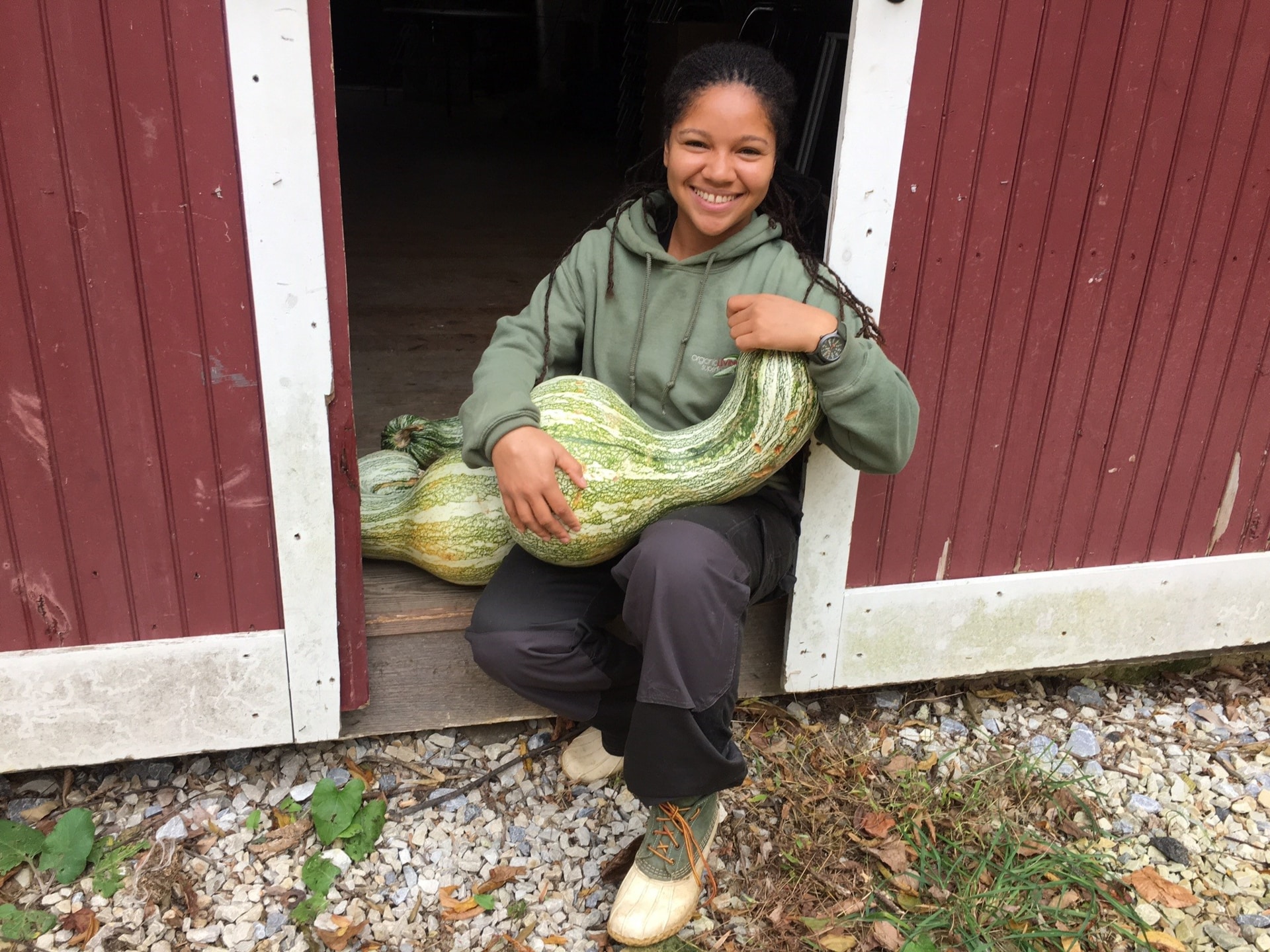
Amirah Mitchell of Sistah Seeds with a Green Striped Cushaw squash
We were able to talk with Mitchell to learn more about their journey from a farming youth program in Boston to the founding and flourishing of Sistah Seeds. Learn more about them in this Meet the Farmer Q&A:
PA Eats: How did farming first come into your life?
Amirah Mitchell: For me, it began with how I was raised. Growing up, my parents really instilled in me a love of being outside, being in nature. My mom would take my brother and me out for hikes at the Blue Hills, which is this wonderful hiking area not far from where we lived. When my Grandma Caroline came to live with us, she’d take care of our house plants and grow her favorite things, like hydrangea and hostas. She grew up on a farm in Georgia, and while she left that life and put that all behind her, she still loved to garden and be outside.
But I didn’t start farming until an opportunity came my way by way of a youth program in Boston, The Food Project in Boston. It basically runs like a summer program, but is a paid opportunity for young people to work on a farm, learn about the food system, get to work in the farmers markets and prepare food they’d grow for homeless shelters. I was 14, it was the summer before I entered high school, and this was my first ever job. It came at a challenging time in my life, and the farm became this sanctuary and I attached myself to agriculture. I caught the bug and decided I wanted to be a farmer.
Did you study agriculture or farming in college?
No, I studied Environmental Science at Spelman College. That was in 2011, and I was no longer really thinking about being a farmer. It didn’t seem like an option … I wanted to do it, but it wasn’t what my parents wanted for me. There’s a lot of trauma with agriculture in our community and they didn’t want for me a life of hard labor. I’m only a few generations removed from people who lived and worked on the land as sharecroppers growing cotton in the Deep South. So, instead, I thought I’d do something agriculturally related where I could still be around farms, maybe research or farm extension services.
But then, during college I realized that I didn’t like practicing science and I just really wanted to farm. I ended up leaving school and started working on farms, did some landscaping jobs, and worked at a couple of nonprofits that did farm work. I was just trying to get back into that world. I started going to all these farming conferences, and at one I met Ben Burkett, who at the time was the head of the Mississippi Association of Cooperatives. We had a brief conversation, and he inspired me to look into seeds. He said there was a real need for more Black seed producers and Black seed companies providing seeds for our communities. I took that as a charge and decided in that moment to refocus my farming career into seeds.
Was the idea of growing and selling seeds on your radar before that conversation?
You’d think it’d be obvious to a farmer that seeds are something that you can grow and reproduce yourself. But with our modern agricultural system, even within sustainable agricultural movement, seeds are often so overlooked! It’s taken for granted that you can purchase seeds, and it’s easy to not think about where they are coming from. Seeds had been on my mind in a political way, because of GMOs being in the news, but at the time, I considered that a fight of solidarity with communities outside of my own. It took that conversation with Ben Burkett to realize that the need for seed sovereignty wasn’t just a need for other communities and other countries, but an issue that my own community faces and historically has faced. And it was something I could be a part of solving.
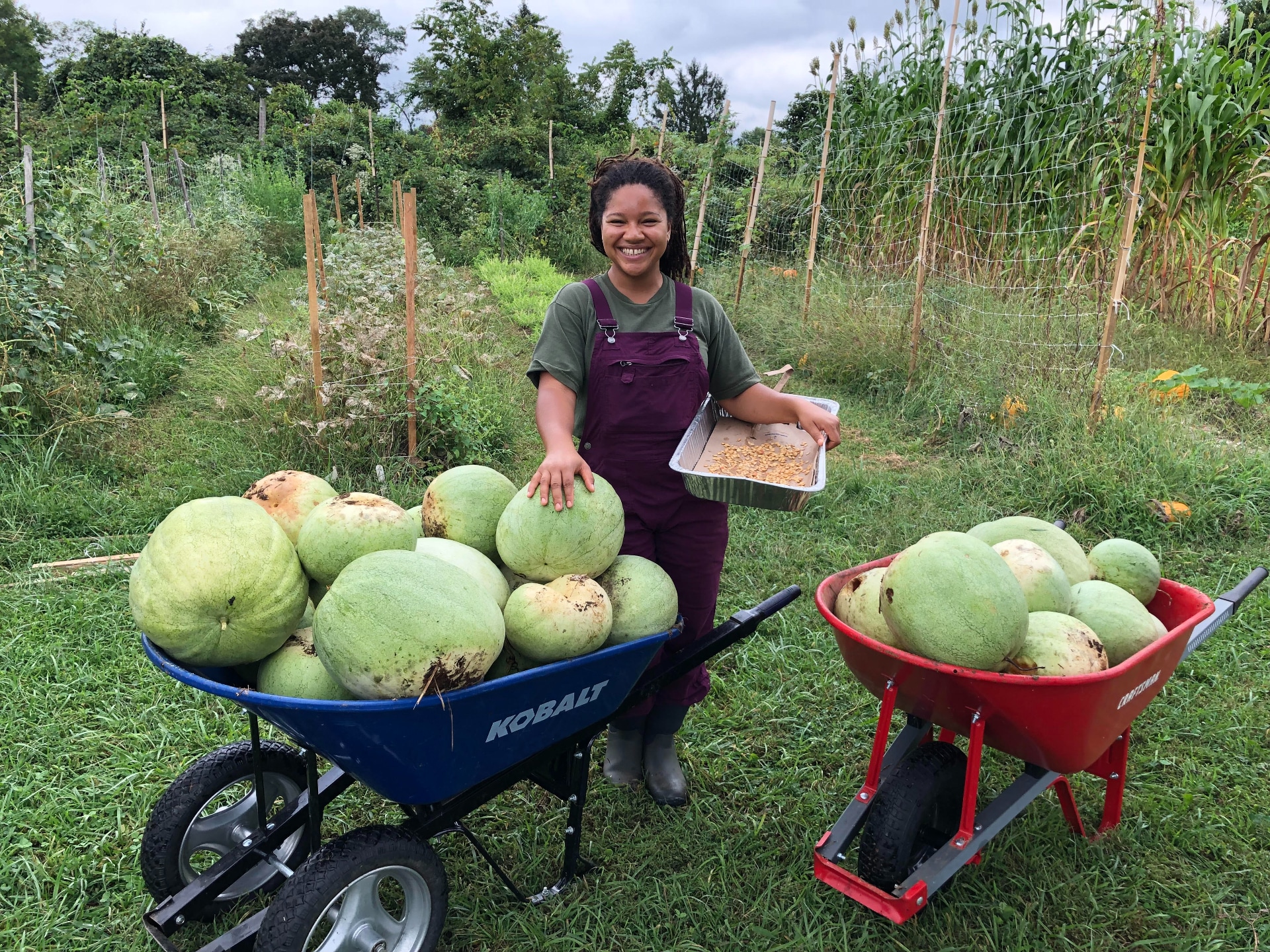
Yeah, it seems like for a lot of us, even if we like to know where our food comes from, seeds are just this product in a packet that we buy at the garden center.
We tend think of seeds as a product, a commodity. It takes a re-framing of the concept to see them as living beings that we’re in relationship with. Also, one of the reasons why I’ve always felt so connected to the land is because I feel that farming is an ancestral calling. I didn’t necessarily have the words for that at 14, but I did feel a calling, I felt connected to my ancestors, to the land, even past all of the trauma associated with the land. I also felt connected to joy and healing in the land. So when I began to think about seeds and my relationship with them, something started to click. I realized I was called to steward Black seeds for Black growers.
That’s how I ended up in Philadelphia. I decided to move there and learn more, and I worked at Truelove Seeds. [Truelove founder] Owen Taylor took me under his wing, and I learned so much about seed keeping as a cultural and community practice. So, then I chose to go to get a B.S. in Horticulture from Temple University, which has this beautiful arboretum.
When did your plans for Sistah Seeds begin to take shape?
I formally registered my business in 2021, but Sistah Seeds is a dream that’s been so many years in the making. I have journals from 2015, maybe even earlier than that, of notes and thoughts and dreams. I knew I wanted to one day be on land of my own. Once I re-enrolled in college, I took all those journals and started planning. After I graduated from Temple, I spent the next year working on my business plan while working at Greensgrow Farms and running a fellowship program to train other aspiring seed keepers.
I was searching for land, though I didn’t have any resources to buy land, and still don’t, but a colleague told me about The Seed Farm, an incubator space in the Lehigh Valley, and I applied and got accepted. You pay a lease and are able to rent greenhouse space and tractors; it’s a great resource for getting started. That’s where I’ve been for the past two years, and my partner and I moved out here to be closer to the farm. I started a GoFundMe in order to fund a full year of farming with no income, because it takes a full season to get your first seeds. I started farming in the spring of 2022, finished my seeds in the early winter of 2022, and started selling my seeds in the beginning of 2023.
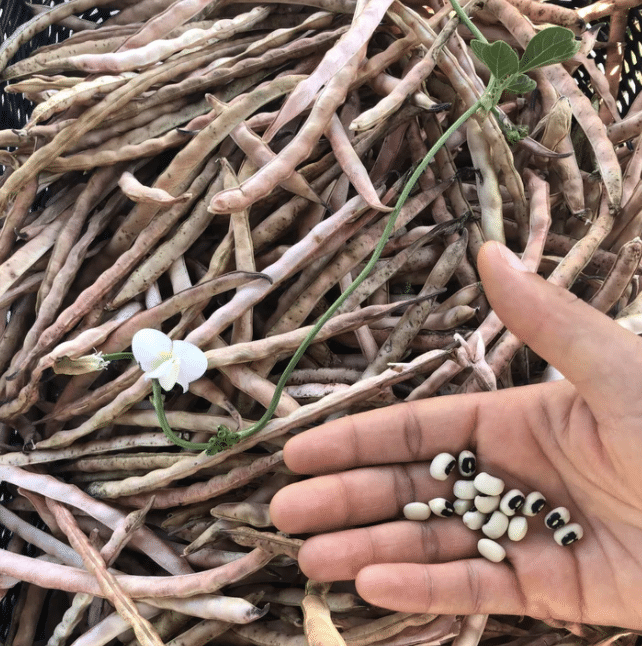
Ezelle Family Fish Eyed Peas seeds from Sistah Seeds
Looking through the Sistah Seeds catalog, so many of the seeds have amazing stories behind them. How are these stories shared with you?
With seed stories, the oral tradition is often far more important and valuable than what we can find written down. They’re not necessarily recorded. But the family heirlooms, the ones passed through generations in communities, those are all oral traditions. Someone has to able and willing to receive that story and retell it. It is easy for seed stories to get lost, which is why seed keepers place such a high importance on telling them. A lot of the stories I’m able to tell are because seed keepers took on that work. For instance, with the Ezelle Family Fish Eyed Pea, those came to me from a seed keeper in Appalachia who shared that story with me. Now that I have a seed company, I can help connect people to these seeds and their stories.
How do you choose which seeds you’re going to grow and sell?
A lot of my catalog was selected based on things I’ve personally enjoyed growing in the past, as well as new things I an interested in. In the future, we’ll grow based on the people and community that we’re building around the farm. People will say, “I have a great aunt in South Carolina, she told me about this variety, can you help me find it?” I’m hoping we can expand access of who’s able to get these seeds and help people find things that we think are lost but are waiting to be found. My intention during this first year was to focus on growing seeds for other seed companies while I fine-tuned my understanding of business, but I had so many requests from people who want to buy directly that I made the decision to open my online store sooner.
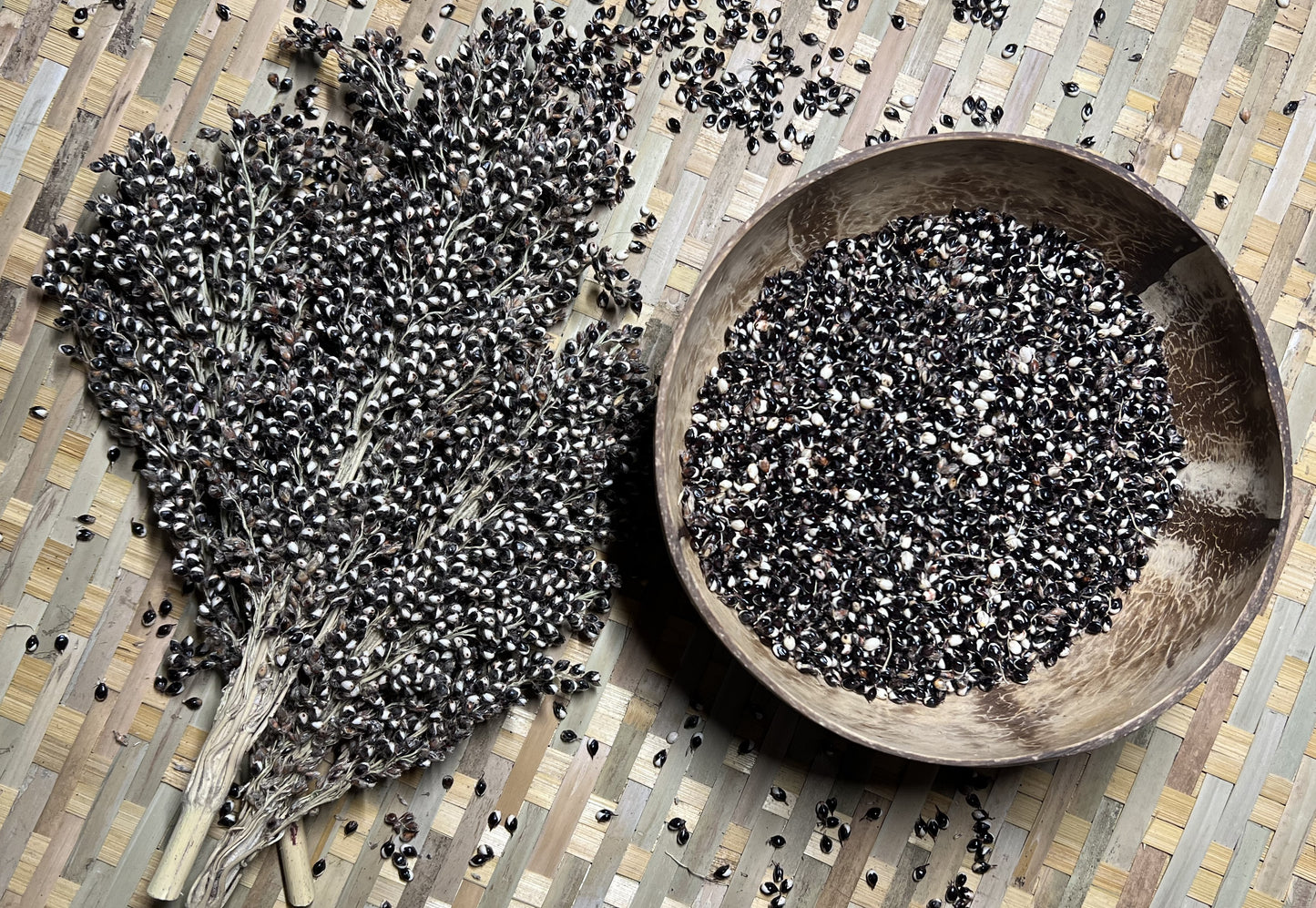
White African Sorghum Seeds from Sistah Seeds
Now that you are selling directly to people, what has it been like? And what are your plans for the future?
During the first couple of days there was a massive rush of orders, it was overwhelming! The whole past year I spent farming out here, there were times I felt really alone in this. But when orders started coming in, and I was getting emails from people who were so excited, that’s when I finally felt that I had community. And I really do want more people to know that we’re here. Sistah Seeds is never going to be one-stop shopping, but if you’re looking for something special and important to you culturally, I’m hoping you’ll take a look.
As for the future, I’m in the very beginning stages of looking for land, because where I am now is an incubator farm, and you’re not supposed to stay there forever. It can take a long time to find the right piece of land, and I want to find where is going to be home for me and my partner and our seeds. I want to look a little further south. Right now we’re in a very white rural area, and I want to be in a rural area where I can find more community with other Black people.
To learn more about Sistah Seeds or shop for its products, visit its website and follow along on Instagram.
- Photos of Amirah Mitchell: Owen Taylor
- Seeds photos: Sistah Seeds
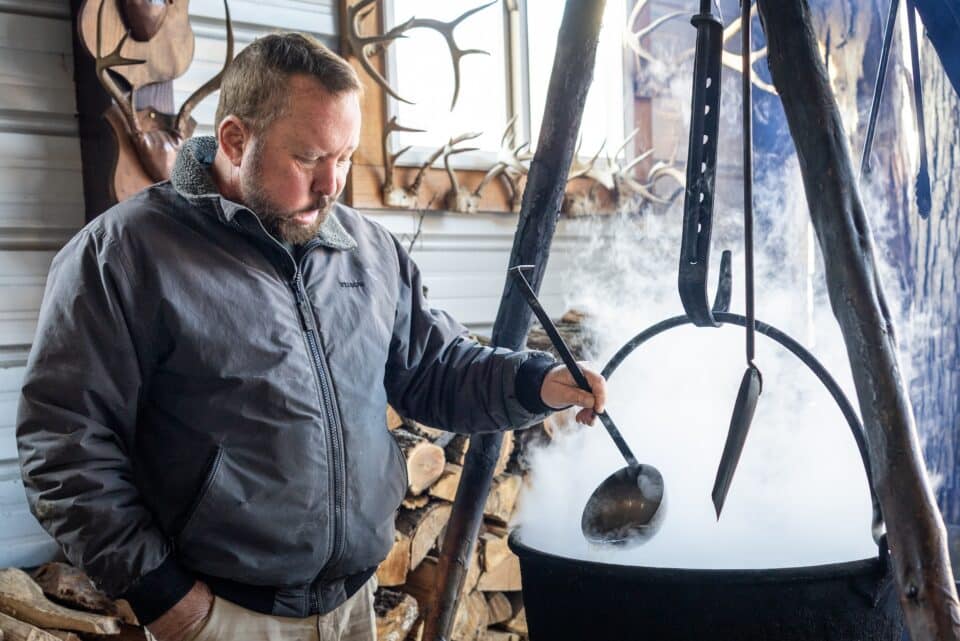
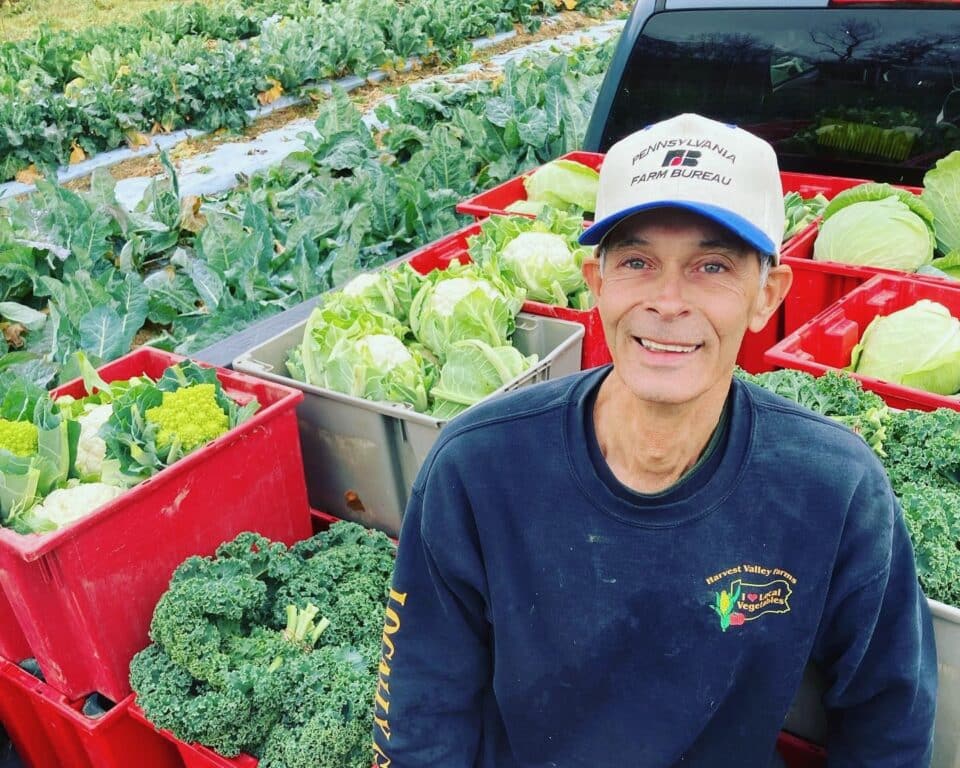
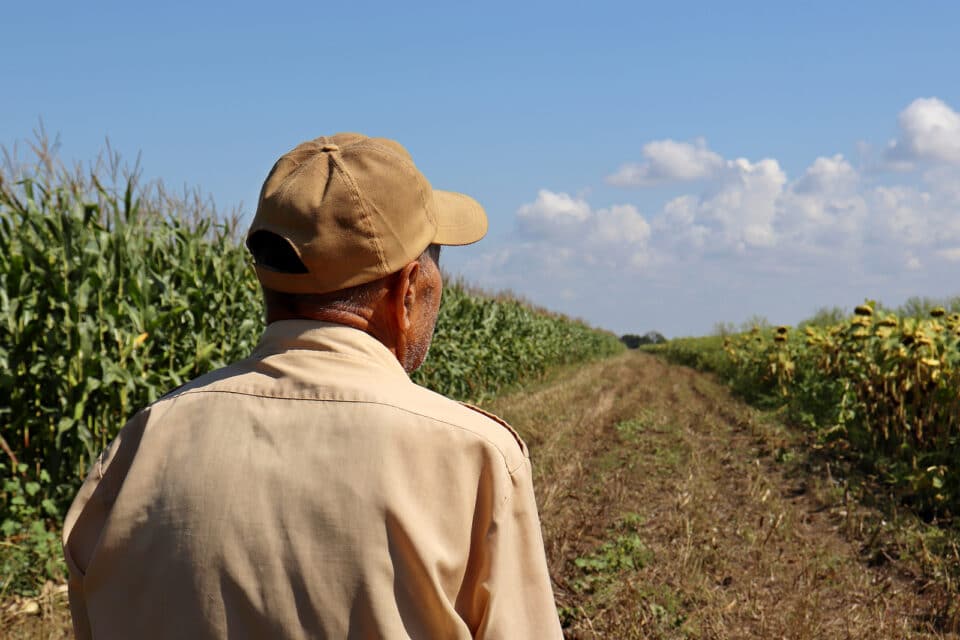
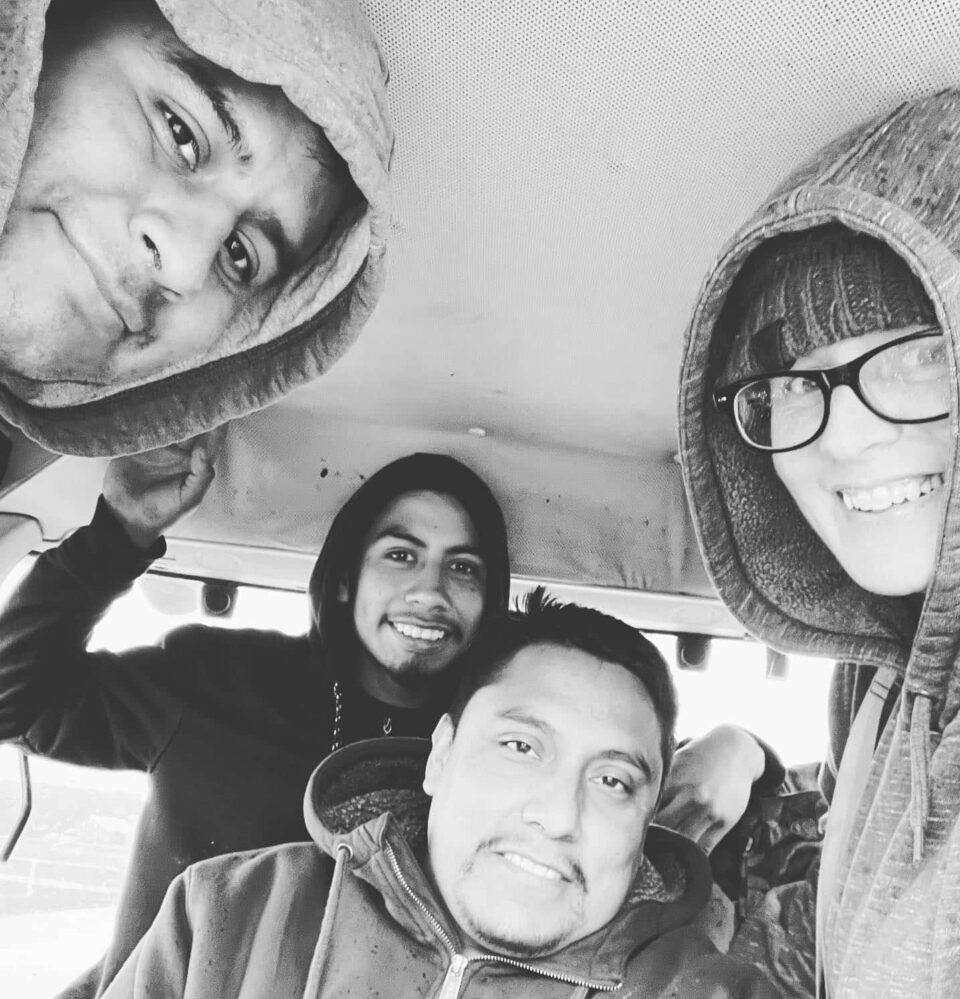

One Comment